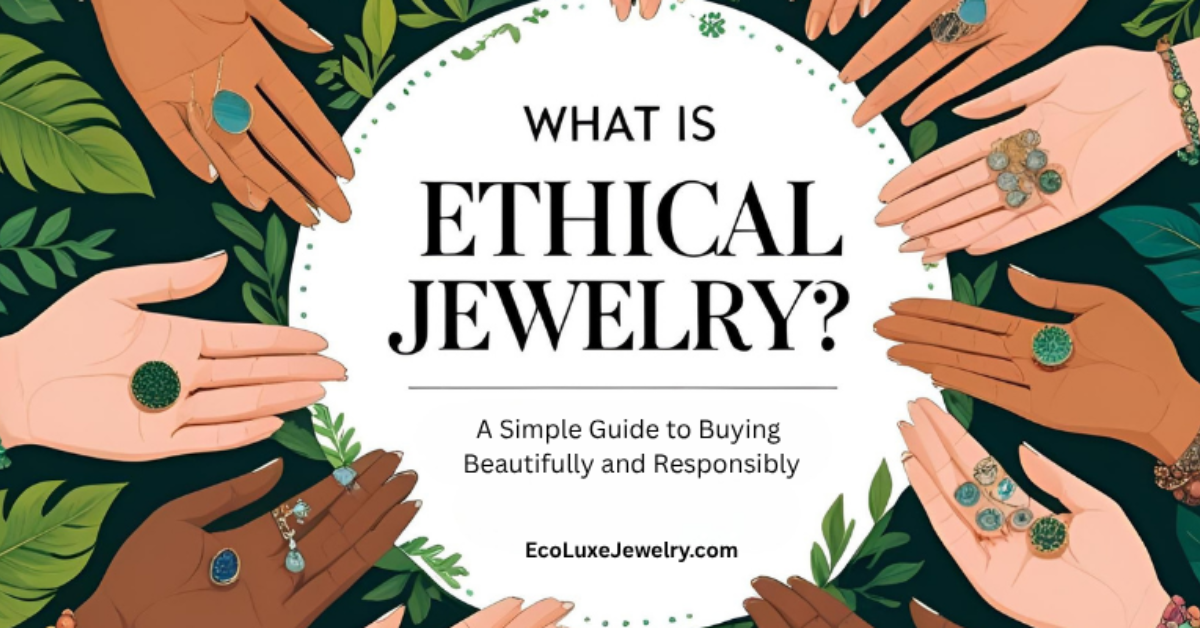In a world where conscious shopping is more important than ever, ethical jewelry has become a shining example of how beauty and values can coexist. But what exactly does “ethical jewelry” mean? Whether you’re new to the idea or looking to align your purchases with your beliefs, this guide will help you understand the meaning, materials, and impact behind ethical jewelry — and why it’s worth considering for your next treasured piece.
What Is Ethical Jewelry?
Ethical jewelry refers to pieces made with care for the people, planet, and processes involved in their creation. Unlike mass-produced or fast fashion jewelry, ethical jewelry is crafted with a focus on:
- ✅ Fair labor practices
- ✅ Eco-friendly materials
- ✅ Responsible sourcing
- ✅ Supply chain transparency
Ethical jewelry means everyone — from miners to makers — is treated with respect and fairness.
Why Ethical Jewelry Matters
Most conventional jewelry comes at a hidden cost: exploitation, pollution, and lack of transparency. Here’s why mindful choices make a difference:
Social Impact
Many ethical brands work with global artisans, ensuring they’re paid fairly and work in safe conditions. Supporting these companies helps break cycles of poverty and builds stronger communities.
Environmental Responsibility
Recycled metals, lab-grown diamonds, and responsible sourcing reduce the harm caused by traditional mining and manufacturing.
Personal Connection
Knowing who made your jewelry, how it was made, and what it supports gives each piece deeper meaning. You’re wearing more than a look — you’re wearing your values.
Key Features of Ethical Jewelry
How do you spot ethical jewelry? Look for these signs:
1. Recycled Metals
Using reclaimed gold, silver, and other metals reduces environmental impact and waste — with no compromise in quality.
2. Lab-Grown or Conflict-Free Stones
Ethical jewelers avoid stones linked to conflict. Look for lab-grown diamonds or traceable, responsibly sourced gemstones.
3. Fair Trade Practices
Brands that support artisan partnerships or carry Fair Trade certification are usually transparent about their practices.
4. Eco-Conscious Packaging
Look for recyclable, compostable, or reusable packaging — a small detail that shows a big commitment to sustainability.
5. Transparency
Ethical brands proudly share where their materials come from and how their jewelry is made. Vague brands? Proceed with caution.
Common Certifications and Terms
Understanding the language of ethical jewelry helps you shop with confidence. Keep an eye out for:
- Fairtrade Gold — Guarantees fair wages and safe working conditions for miners.
- RJC Certification — Ensures responsible sourcing through the Responsible Jewellery Council.
- Kimberley Process — Aims to eliminate conflict diamonds from the supply chain.
- B Corp — Recognizes brands committed to high social and environmental standards.
- Certified Recycled Metals — Confirms reclaimed content from credible sources.
Is Sustainable the Same as Ethical?
Not quite — but they’re closely connected:
- Ethical = Focus on people (fair labor, community impact)
- Sustainable = Focus on the planet (climate impact, resource use)
The best jewelry brands are both ethical and sustainable.
How to Start Shopping for Ethical Jewelry
It’s easier than you think! Here’s how to get started:
- Do Your Research — Look for sourcing details and transparency.
- Buy Less, Choose Well — Invest in high-quality pieces that last.
- Look for Certifications — Trust third-party labels for credibility.
- Support Small or Local Makers — Many artisans create beautiful, ethical pieces with care.
- Ask Questions — Don’t be afraid to contact brands about their practices.
Everyday Ethical Jewelry
Ethical jewelry isn’t just for special occasions. More brands are offering beautiful pieces perfect for daily wear:
- Minimalist recycled gold rings
- Lab-grown diamond studs
- Artisan-crafted necklaces
- Statement earrings made from reclaimed materials
You don’t have to sacrifice style to shop ethically — in fact, it can elevate your look and your values.
Where to Buy Ethical Jewelry
Explore our page on Ethical Jewelry Brands for a curated list of ethical jewelry companies committed to transparency, sustainability, and style.
Final Thoughts
Ethical jewelry isn’t just a trend — it’s a movement rooted in respect, responsibility, and beauty with purpose.
When you choose ethical jewelry, you’re choosing a better world — one piece at a time.
Let your style reflect your values. Let your jewelry shine with meaning.
Explore More:
How to Tell If Jewelry Is Really Ethical
Green Fashion and Ethical Jewelry
Inclusive Jewelry: Ethical, Sustainable, Made for Everyone

You taught me something new today. I was not aware that sustainable and ethical were two different things, similar but different. With jewelry, it is important to look after the people who make it and find it. Especially the miners who often work in terrible conditions with very little pay to show for their efforts and risks.
So I am sure that this will leave things like gold and silver with a lot to explain, and I don’t know how you would prove ethical practices here.
Hi Michel, thank you so much for sharing – your awareness and care mean a lot! Recognizing the distinction between sustainable (environmentally friendly) and ethical (fair and safe labor practices) is a big step in choosing jewelry that truly aligns with your values.
When it comes to metals like gold and silver, ethical sourcing often depends on certifications such as the Fairmined or Fairtrade label, which require transparency around fair wages and safe working conditions for miners. Tracing these practices can be challenging, but they do exist—and it’s worth seeking out those certifications when you shop for jewelry.
If you’re interested in exploring how to verify ethical practices in metals more deeply, you might enjoy our post How to Tell If Jewelry Is Really Ethical. It includes practical tips for recognizing jewelry that supports people and planet.
Thanks again for your thoughtful reflection – here’s to more mindful sparkling ahead!